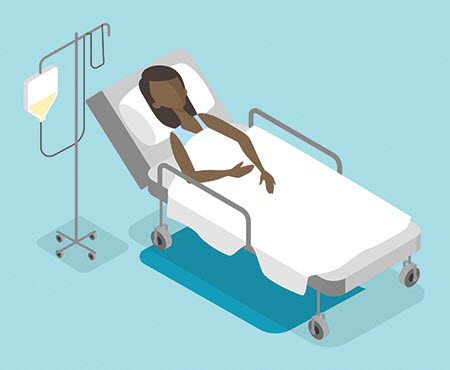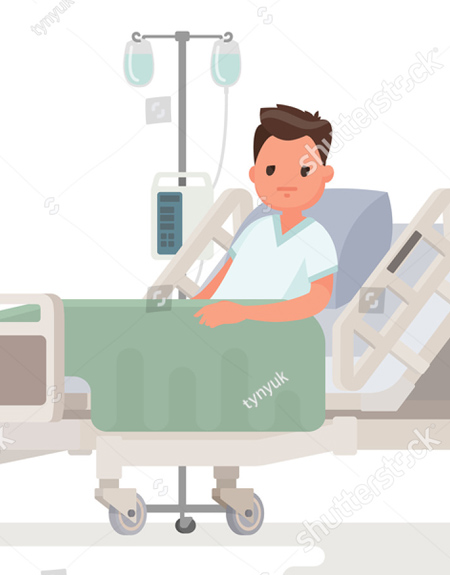 I imagine that you’re scared or overwhelmed right now.
I imagine that you’re scared or overwhelmed right now.
When you’re diagnosed or dealing with a chronic physical illness, you have to deal with the same stresses as everyone else… and SO much more.
With a new medical diagnosis comes a radical shift in how you spend your time, how you relate to your body, and even how you understand who you are. There are appointments to keep track of, procedures to endure, and new and sometimes experimental treatments or medications. As a result, your life can look completely different than it did just days ago before you received that diagnosis.
You have so many questions that still need to be answered.
Will I be able to do the activities I love to do?
Will I be able to travel?
See my children or grandchildren grow up?
How will I afford the new medicines or equipment I may need?
Will I be able to stay in the home I am currently living in?
Will I need more intensive help as my condition persists?
 And CHANGES… there are SO many changes.
And CHANGES… there are SO many changes.
… changes to the ebb and flow of the day. Some days you are just too fatigued to get out of bed, care for your children, or do your work. Activities are interrupted by checking blood sugar, breathing treatments, or changing feeding tubes.
… changes in your routine. Doctors’ appointments, physical therapy, repeated lab work, and pulmonary function tests all have to fit your already busy day.
… changes to your diet. Sometimes you find that you have to cut out entire food groups, adjust eating times to address side effects, or rely on tube feeding or TPN for nutrition.
… changes in how you see and trust your body. The body that once ran track and field or back and forth across the soccer field can no longer move quickly. The body you counted on to do simple tasks like breathe and process foods properly no longer does what it is supposed to. Your body hurts, and you feel as though it has betrayed you.
… changes in the way you look at your life. You always saw yourself as capable, strong, and focused on helping other people. Instead, all your time and energy are used to take care of your body, either sleeping or going to appointments. You feel selfish, and your mind is always preoccupied with worry about your health.
 Your mental and physical health are fundamentally intertwined.
Your mental and physical health are fundamentally intertwined.
When we feel overwhelmed and “stressed out,” we often feel that in our bodies. This kind of stress can manifest as stomachaches, headaches, rapid heart rate, etc. We have all been there.
Poor mental health puts us at risk for deterioration of physical health, AND poor physical health is associated with an increase in mental health struggles.
The stress of adjusting and managing a chronic medical illness compounds the everyday stresses and puts us at greater risk of depression and anxiety. While you are working with your medical team to find treatments and medication to manage your medical issues, it is equally important to work with a therapist to address the feelings that come with a new or chronic diagnosis.
 I know it’s a lot, but I’m here to help.
I know it’s a lot, but I’m here to help.
We’ll explore what your diagnosis really means.
Diabetes, COPD, Cystic Fibrosis, Multiple Sclerosis, Ehlers Danlos Syndrome, Crohn’s Disease, etc., all affect your body in different ways. I can help you understand what to expect when you are newly diagnosed.
I’ll teach you medical language so that you can properly advocate for yourself.
Every diagnosis brings a steep learning curve of new medications, procedures, therapies, and treatments. I can help you understand these things, how they work, and what questions you still need to get answers to.
You’ll learn to relate to your new or changing body.
As you recover from surgery or other invasive medical treatments, I will help you adjust to what your body can and cannot do. As you learn to get regular infusions or give yourself injections, I can help you deal with your worries about constant needle sticks. As you learn to adjust to changing energy levels or activity patterns, you can restructure your daily life to feel more in control.
I’ll support and comfort you as you face new challenges.
Sometimes, medical conditions come with significant deterioration to quality of life or challenge us to confront our mortality. Having a place to talk about the new physical and emotional stressors and come to terms with the resultant changes to our lives can make the process of dealing with a major medical illness much easier.
It’s time to take control.
Stop worrying alone. I can help you decipher the complicated medical jargon you will hear and read, and I can help you learn what to anticipate as you move forward with your treatments. I am here to walk beside you and help you adjust to your “new normal.”
Call me for a complimentary 20-minute consultation at (424) 744-3774.

